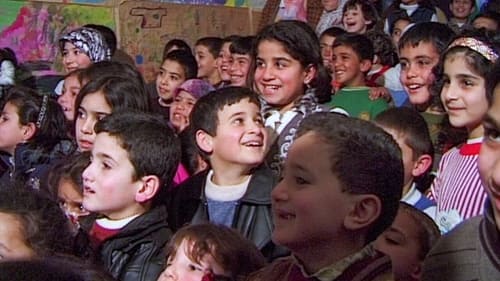
Director
After her husband was kidnapped in 1982 during the civil war in Lebanon, Wada Hilwani gathered together the families of the kidnap victims and formed the Committee for the Families of the Kidnapped and Missing. Decades after the end of the war, these families continue their painful search for the truth about their loved ones, and for justice against war crimes.

Producer
33 Days chronicles the efforts of theatre director Sharif Abdunnur, graphic designer Sharif Bibi, journalist Fadia Baszzi and Mariam Al-Bassam, director of the news desk at New TV, as they try to provide emergency aid, report current news of the conflict and help Lebanese children process the violence and destruction they see around them on a daily basis. Masri's film is full of compassion and humanity even as it records the horrible devastation of war.

Director
Acclaimed director Jean Chamoun looks at the lives and works of some of the women who have joined in the fight for their Palestinian homeland. We learn of young resistance fighter Kifah Afifi’s experience as a survivor of the 1982 Shatila massacre in Lebanon when she was just twelve years old. She tells about fighting the Israeli occupation of South Lebanon in the 1990s and of her imprisonment in the Khiam detention facility, which was run by Israel’s auxiliary militia, the South Lebanon Army.

Associate Producer
This heartfelt documentary from award-winning filmmaker Mai Masri explores the enduring friendship that evolves between two Palestinian girls—Mona, who was born and raised in the economically marginalized Shatila refugee camp in Beirut, and Manar, who lives in the Dheisha refugee camp under Israeli control. The two girls begin their friendship as penpals, sharing the similarities and differences of life in the two refugee camps. Mona and Manar are finally able to meet face-to-face at the Lebanese-Israeli border during Israel's withdrawal from South Lebanon. But when the second intifada suddenly erupts around them shortly thereafter, both girls must face heart-breaking changes in their lives.

Producer
To escape the civil war between Christians and Muslims, a Lebanese family moves from the countryside to Beirut, only to find themselves caught in an equally dangerous situation

Writer
To escape the civil war between Christians and Muslims, a Lebanese family moves from the countryside to Beirut, only to find themselves caught in an equally dangerous situation

Director
To escape the civil war between Christians and Muslims, a Lebanese family moves from the countryside to Beirut, only to find themselves caught in an equally dangerous situation

Producer
Many people first became aware of the Shatila refugee camp in Lebanon after the shocking and horrific Sabra-Shatila massacre that took place there in 1982. Located in Beirut's "belt of misery," the camp is home to 15,000 Palestinians and Lebanese who share a common experience of displacement, unemployment and poverty. Fifty years after the exile of their grandparents from Palestine, the children of Shatila attempt to come to terms with the reality of being refugees in a camp that has survived massacre, siege and starvation. Director Mai Masri focuses on two Palestinian children in the camp: Farah, age 11 and Issa, age 12. When these children are given video cameras, the story of the camp evolves from their personal narratives as they articulate the feelings and hopes of their generation.

Director
When Leila, a young doctor, returns to her village in south Lebanon, she finds it badly damaged after the 1993 Israeli attack. Israeli bombing during this episode razed 50 villages and left half a million civilians homeless, causing a flood of refugees into Beirut. Many of those who fled south Lebanon have not returned, choosing instead to live a scavenging existence in bombed-out buildings in the capital, where they’re out of range of the Israeli-occupied “security zone” in the south. Through Leila’s relationship with her family and the women and children of the surrounding villages, we get to know the hopes and dreams of the people who have remained in south Lebanon as they work to rebuild their homes and their lives.

Director
In Suspended Dreams, Jean Chamoun and Mai Masri link the stories of four people who are attempting to reconstruct their lives after Lebanon's long and devastating civil war. The film features two ex-militia fighters from Beirut; a woman searching for her missing husband; a playwright from southern Lebanon. Each share their lives and hardships amidst the rubble of their war-torn homeland.

Director
In this award-winning documentary, directors Masri and Chamoun focus on the women who played a crucial role in fighting the Israeli invasion of southern Lebanon. Preserving their stories on camera, Wild Flowers: Women of South Lebanon is a poignant documentary about courage, resistance, and hope.

Director
Filmed on the streets of Beirut, War Generation Beirut is a mesmerizing, award-winning documentary that explores the life experiences of three generations of young people as they struggle to survive in Lebanon’s war-torn capitol city. The film also traces the history and origins of Lebanon's Civil War.

Director
Under the Rubble is the filmmakers’ harrowing attempt to tell the real story behind the 1982 Israeli invasion of Lebanon as it took place in Beirut—a traumatizing experience for the city and its people. This moving and informative documentary won the Special Jury Award at the Valencia Film Festival.

Director
In the early summer of 1976, right-wing militias representing a coalition of ultra-nationalist and counter-revolutionary forces laid siege to the refugee camp of Tall al-Zaatar (“Hill of Thyme”) in Beirut. After holding out for months without food, water, or medical supplies, and under heavy artillery and sniper fire, the camp fell to the militias on 12 August. What followed was one of the worst atrocities of the civil war, with over 2,500 civilians massacred and the camp razed to the ground. Produced after the massacre, but featuring footage shot before and during the siege, Tall al-Zaatar remembers the camp and its community, recounting the long months of siege and resistance, and recalling the horrors of the massacre through the testimony of survivors.













